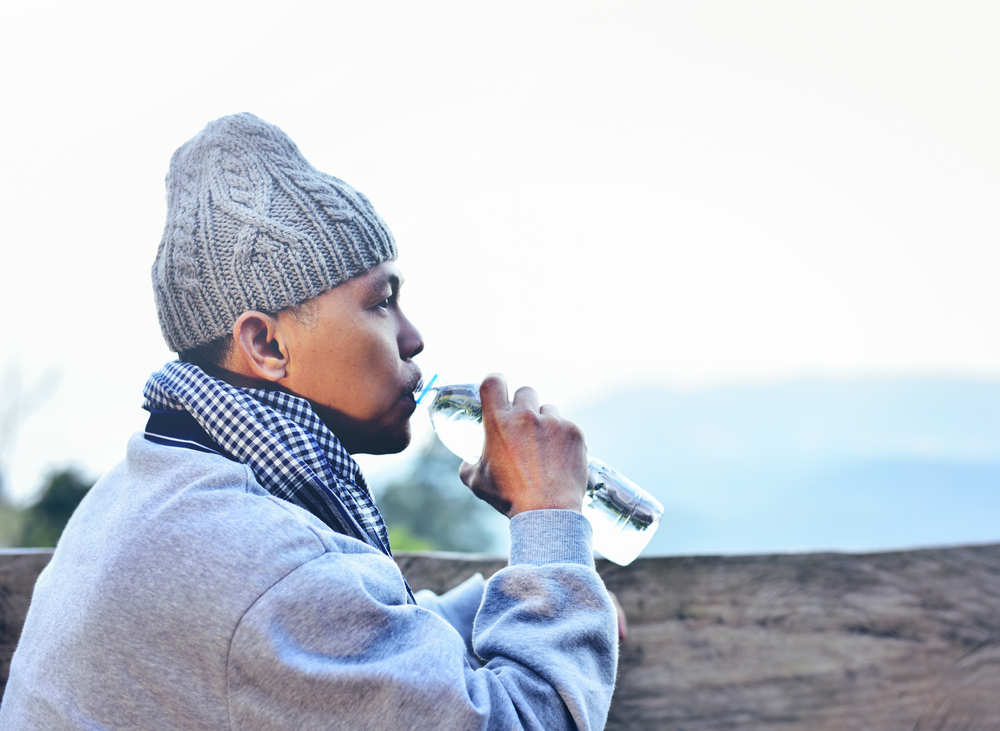By: Amanda Belo
The average adult human body is between 50 – 65% water, with women tending to have lower water levels because they have more fatty tissue and that fattier tissue contains less water than leaner tissue. [1] With the dry air and cooler temperatures, dehydration is much more common in the cold winter months. Find out more on winter dehydration and what you can do about it below!
People lose water from their body in a variety of ways, such as sweating, crying, drinking alcohol – even breathing! When you lose 2-3% [1] of the water in your body, dehydration begins to set in.
Dehydration Does Not Discriminate
Many people associate thirst and dehydration with the effects of warmer weather or physical exercise. But that is simply due to the summer heat and rising humidity. This makes it more apparent that your body needs a little thirst-quenching. Dehydration doesn’t actually discriminate between seasons. It is equally important during colder months to make sure your body is getting enough fluids and staying hydrated. A few reasons for winter dehydration may include [2]:
- Breathing in cold and dry air which causes the body to lose significant amounts of fluid.
- Perspiration in colder temperatures becomes vapor. This leaves you without the visual cue of sweat on the skin, which prompts the need to hydrate.
- People feel less thirsty in the winter, but the amount of water you need does not change.
Symptoms of Dehydration
Water is indispensable. In addition to allowing cells to grow, reproduce and survive, several of water’s important functions include regulating body temperature, flushing out body waste and toxins, forming saliva and helping with absorption of nutrients from food, lubricating joints, and helping deliver oxygen all over the body. [3] Water also helps support healthy metabolism. [2] Since water is so essential to the human body operating well, the body experiences warning signs when it is lacking. Fatigue, dry skin, infrequent urination and darker colored urine, headache, dizziness, dry mouth, and few or no tears are physical symptoms of dehydration you may experience. [4]
What Can You Do to Keep Hydrated Year-Round?
- Meet the recommended intake of water needed (from food and beverage), daily. For women that is approximately 2.7 liters (11.5 cups), and men 3.7 liters (15.5 cups). [5]
- Replace what you lose through breathing, urination and perspiration. “Sweat can reduce your body temperature and force your heart to work harder to maintain blood flow and body temperature.” [6]
- Wear layers of clothing to absorb perspiration, particularly when you exercise. [6]
- Drink water often – even when not thirsty – and avoid or drink in moderation beverages that dehydrate the body (e.g. alcohol, carbonated beverages)[2]
- Drink room-temperature liquids. The colder a beverage, the faster it is absorbed. [6]
- The darker your urine, the more water you need. Pay attention to color of your urine, as well as the frequency you need to urinate. [2]
- Eat fresh fruits and vegetables with high water content.
- Keep a water bottle handy
How do you stay hydrated in these cold winter months? Tell us in the comments below!
Resources:
[1] Helmenstine, Ph.D., A. (2017, December 29). How Much of Your Body Is Water? Retrieved from https://www.thoughtco.com/how-much-of-your-body-is-water-609406
[2] Meisel, A. (2016, February 24). Stay Hydrated in Cold Weather. Retrieved from https://www.summitmedicalgroup.com/news/living-well/stay-hydrated-cold-weather
[3] The Water in You. Retrieved from https://water.usgs.gov/edu/propertyyou.html
[4] Davis, MD, PhD, Charles Patrick. (2017, August 31). Dehydration in Adults. Retrieved from https://www.emedicinehealth.com/dehydration_in_adults/page3_em.htm
[5] (2004, February 11). Dietary Reference Intakes: Water, Potassium, Sodium, Chloride, and Sulfate. Retrieved from http://www.nationalacademies.org/hmd/Reports/2004/Dietary-Reference-Intakes-Water-Potassium-Sodium-Chloride-and-Sulfate.aspx
[6] Stroler, Felicia D. (2014, January 29). 8 Tips for Hydrating in Cold Weather. Retrieved from http://www.health.com/fitness/8-tips-for-hydrating-in-cold-weather





Comments (0)